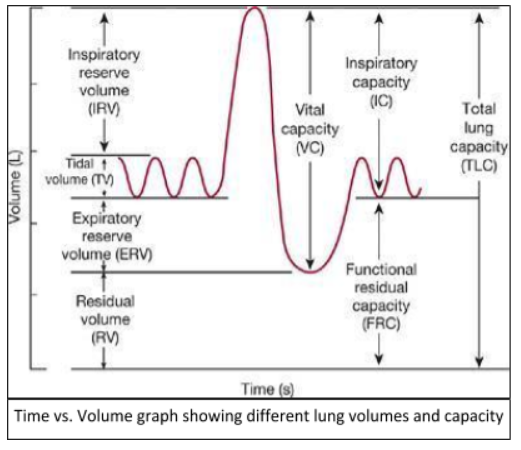
The resting tidal volume to vital capacity ratio should be:
(a) 1:5
(b) 1:10
(c) 1:20
(d) 1:40
Answer
594k+ views
Hint: When a person rests, he tends to inhale or exhale a lesser amount
of air compared to when he is exercising.
Complete answer:Tidal volume (TV) is the total amount of air we inhale or exhale in one breath, when we are normally breathing i.e. without putting in any effort.
It is often called resting tidal volume, because when we are resting we tend to not put any extra effort in breathing. In a normal, adult person the resting tidal volume is about 500 mL of air. Now, vital capacity means the maximum amount/volume of air which can be expelled from lungs after maximum inhalation of air.
For this, effort has to be given to breathing.

Vital capacity can range between 3000 mL to 5000 mL approximately.
The value depends upon a person’s age, overall health, height etc. Vital capacity is equal to the sum of IRV (inspiratory reserve volume), TV (tidal volume) and ERV (expiratory reserve volume).
So, naturally its value is much higher than resting tidal volume. From the above mentioned value of both, we can conclude that the ratio of resting tidal volume to vital capacity is about 1:10.
So, the correct answer is 1:10
Note:IRV or inspiratory reserve volume means the amount of air which can
be inhaled even after a normal inhalation.
ERV or expiratory reserve volume refers to the amount of air that can be exhaled after
a normal exhalation.
of air compared to when he is exercising.
Complete answer:Tidal volume (TV) is the total amount of air we inhale or exhale in one breath, when we are normally breathing i.e. without putting in any effort.
It is often called resting tidal volume, because when we are resting we tend to not put any extra effort in breathing. In a normal, adult person the resting tidal volume is about 500 mL of air. Now, vital capacity means the maximum amount/volume of air which can be expelled from lungs after maximum inhalation of air.
For this, effort has to be given to breathing.

Vital capacity can range between 3000 mL to 5000 mL approximately.
The value depends upon a person’s age, overall health, height etc. Vital capacity is equal to the sum of IRV (inspiratory reserve volume), TV (tidal volume) and ERV (expiratory reserve volume).
So, naturally its value is much higher than resting tidal volume. From the above mentioned value of both, we can conclude that the ratio of resting tidal volume to vital capacity is about 1:10.
So, the correct answer is 1:10
Note:IRV or inspiratory reserve volume means the amount of air which can
be inhaled even after a normal inhalation.
ERV or expiratory reserve volume refers to the amount of air that can be exhaled after
a normal exhalation.
Recently Updated Pages
Master Class 10 Computer Science: Engaging Questions & Answers for Success

Master Class 10 General Knowledge: Engaging Questions & Answers for Success

Master Class 10 English: Engaging Questions & Answers for Success

Master Class 10 Social Science: Engaging Questions & Answers for Success

Master Class 10 Maths: Engaging Questions & Answers for Success

Master Class 10 Science: Engaging Questions & Answers for Success

Trending doubts
What is the median of the first 10 natural numbers class 10 maths CBSE

Which women's tennis player has 24 Grand Slam singles titles?

Who is the Brand Ambassador of Incredible India?

Why is there a time difference of about 5 hours between class 10 social science CBSE

Write a letter to the principal requesting him to grant class 10 english CBSE

A moving boat is observed from the top of a 150 m high class 10 maths CBSE




